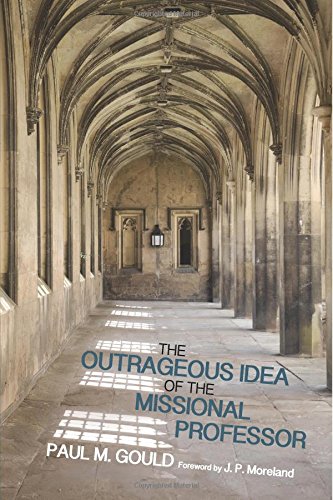Paul Gould has written an excellent, unique, and timely resource for Christian professors. It could be something you’ll want to give or recommend to any Christian you know called to the academic world (either at a Christian college or a secular university).
Now, before you stop reading, in case you don’t know anyone with such a calling or if you yourself are not a Christian professor, please consider some important lessons the book offers to all Christians who want to love God with all their minds.
The book’s title The Outrageous Idea of the Missional Professor is an allusion to George Marsden’s landmark work from almost twenty years ago, The Outrageous Idea of Christian Scholarship. Marsden dared to suggest that scholarship could and should be shaped by a worldview based on the notions of creation, fall, redemption, and consummation. The fact that he called this idea “outrageous” and that he was not being unreasonable in doing so, shows just how far the current academic world is from what Christians would hope for.
Paul Gould, a trained philosopher and professor at Southwestern Baptist Theological Seminary, pushes the argument further than Marsden or some of his followers have, in urging Christian professors to see themselves as gospel-proclaimers to their students and fellow professors as well as reformers of their academic disciplines. He makes a compelling case from the Bible with contemporary examples of those who are taking missional steps on campus. He also offers many helpful insights of practical steps to take.
For the purpose of this blog, I want to highlight one section where Gould urges his readers to consider the complex nature of “cultivating the Christian mind” (pages 58-66). This section applies to all believers, not just the ones in academia. Cultivating our Christian minds, Gould says, must involve seven intellectual virtues: intellectual courage, intellectual carefulness, intellectual tenacity, intellectual fair-mindedness, intellectual curiosity, intellectual honesty, and intellectual humility.
Here’s how I would briefly define these virtues. I may not represent Gould’s views exactly right but I hope you’ll consider how these virtues should be pursued in your walk with the Lord and consider reading his book to dig far deeper than I can do here.
• To have intellectual courage means to be willing to challenge prevailing views that shape the thoughts of those around us.
• To pursue intellectual carefulness means to be willing to challenge your own understanding of views you hold or those you reject.
• To embrace intellectual tenacity involves challenging yourself to keep pursuing the implications of your beliefs far more than other people ask you to.
• To display intellectual fair-mindedness involves “taking on” other’s views long enough to see what truth they may support and where points of agreement lie.
• To engage in intellectual curiosity involves reading outside current areas of interest and seriously consider new perspectives that could reshape current convictions.
• To live out intellectual honesty includes the willingness to admit when you don’t know certain things or when some convictions are held at less than 100% certainty.
• To incarnate intellectual humility employs phrases like, “I don’t know” or “I’ll need to think about that some more” or “I’ll need to get back to you on that one” and similar phrases we hear far too infrequently in our sound-bite obsessed culture.
It is my prayer that Gould’s book will challenge many inside and outside the university world and will have long lasting results.




Randy, you did a great job of summarizing and clarifying the seven intellectual virtues Paul Gould presents in his thought-provoking book. Kudos to both of you.
Paul, your book motivates and challenges us all of us as Christians to think in the more rigorous ways you suggest. Congratulations on a job (book) well done.